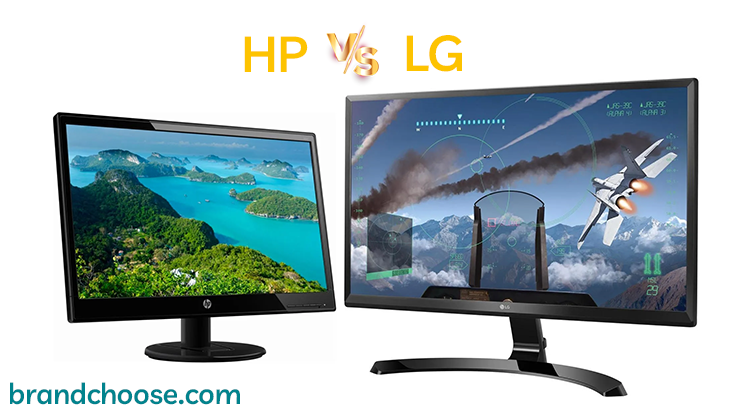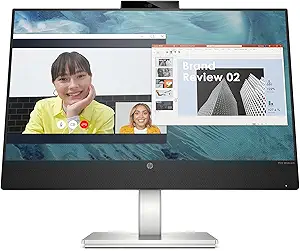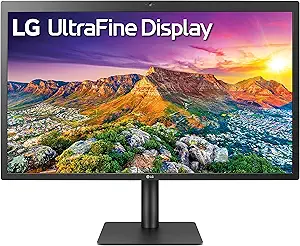In the realm of monitors, HP and LG stand as stalwart contenders, each offering a diverse lineup crafted to meet the demands of modern users. Whether you're a professional seeking color accuracy, a gamer craving immersive visuals, or a casual user in need of reliable performance, the choice between HP and LG monitors can significantly impact your computing experience. Let's delve into the unique features and strengths of both brands to help you navigate through the myriad of options and find the perfect monitor for your needs.
Key Features Comparison
Size
When it comes to the size aspect of computer monitors, both HP and LG offer a wide range of options to cater to different user needs. HP monitors are available in sizes ranging from 19 inches to 34 inches, with their most popular models falling in the 24 to 27-inch category. These sizes are ideal for most home and office uses, providing ample screen real estate for multitasking and media consumption. HP's larger monitors, such as the HP Z34c, feature ultra-wide screens with a 21:9 aspect ratio, providing a panoramic viewing experience that's great for gaming and professional applications like video editing. On the other hand, LG monitors offer an even broader size range, from 17 inches all the way up to 49 inches. LG's UltraWide monitors, such as the LG 49WL95C-W, are particularly notable for their expansive screen size. These monitors offer a 32:9 aspect ratio, effectively replacing the need for a dual monitor setup. However, while these larger monitors offer a more immersive experience, they also require more desk space and may not be suitable for all users. In comparison to other brands, both HP and LG are competitive in terms of the sizes they offer, although LG's range is more extensive.

Response Time
HP and LG are both renowned brands in the computer monitor market, each offering a range of models with varying response times. In terms of response time, which is crucial for high-speed gaming and high-definition video playback, both brands have models that can deliver impressive performance. HP's top-tier gaming monitors, such as the Omen X 27, offer a response time as low as 1ms, which is considered excellent for gaming. Similarly, LG's premium gaming monitors, like the UltraGear 27GL850, also boast a 1ms response time. However, there are differences in the technologies used by each brand to achieve these low response times. HP typically uses TN (Twisted Nematic) panels in its high-performance monitors, which can offer faster response times but may compromise on color accuracy and viewing angles. On the other hand, LG often employs IPS (In-Plane Switching) technology in its monitors, which can deliver excellent color accuracy and wide viewing angles, but traditionally had slower response times. However, LG's latest Nano IPS technology, used in models like the 27GL850, manages to achieve a 1ms response time without the typical drawbacks of IPS panels. Therefore, while both brands can offer similar response times, the underlying technology and resulting trade-offs can differ.
Panel Type
HP and LG are two of the leading brands in the computer monitor market, each offering a range of monitors with different panel types. HP monitors typically use Twisted Nematic (TN), In-Plane Switching (IPS), and Vertical Alignment (VA) panels. TN panels are known for their fast response times, making them ideal for gaming, but they suffer from poor viewing angles and color reproduction. IPS panels, on the other hand, offer better color accuracy and wider viewing angles but have slower response times. VA panels are a middle-ground option, offering better color reproduction and viewing angles than TN panels but slower response times than IPS panels. LG monitors, on the other hand, primarily use IPS panels in their products. This panel type is renowned for its superior color accuracy and wide viewing angles, making LG monitors a favorite amongst graphic designers and video editors. However, the slower response times of IPS panels can be a disadvantage for gamers who require fast response times for competitive gaming. LG has attempted to address this issue by incorporating Nano IPS technology in their latest monitors, which aims to provide the color accuracy of IPS panels with the fast response times of TN panels. Comparatively, both brands offer high-quality monitors, but the choice between HP and LG may come down to the specific needs of the user, whether it's fast response times for gaming or color accuracy for professional work.
Affordability
When comparing the price aspect of HP and LG computer monitors, it is evident that both brands offer a wide range of options catering to various budget categories. HP monitors are generally known for their affordability, especially in the entry-level and mid-range segments. The brand offers a variety of monitors that integrate the latest technologies such as IPS panels, LED backlighting, and Full HD resolution at competitive prices. However, some high-end HP monitors, particularly those designed for gaming or professional use, can be quite pricey. On the other hand, LG monitors are typically priced slightly higher than their HP counterparts. The brand is renowned for its premium monitors that incorporate innovative technologies like Ultra HD 4K resolution, Nano IPS technology, and HDR10 for superior color accuracy and contrast. Despite their higher price point, LG monitors are often praised for their exceptional performance and value for money. While LG's high-end monitors are more expensive than those from HP, they often include features and technologies that justify the higher cost. Therefore, when comparing HP and LG monitors based purely on price, the decision often comes down to the specific requirements and budget of the user.
Reputation
HP and LG are two of the most reputable brands in the monitor market, each having their own strengths and weaknesses. HP monitors are known for their reliability and durability, often featuring the latest technologies such as 4K resolution, IPS panels, and adaptive sync technologies. They are also praised for their excellent customer service and warranty programs, which further enhance their reputation among consumers. However, some users have reported issues with color accuracy and consistency, which can be a concern for professionals who require precise color reproduction. On the other hand, LG monitors have a strong reputation for their innovative features and superior picture quality. They are often at the forefront of new technology, with many models featuring 4K resolution, HDR support, and advanced gaming features like G-Sync and FreeSync. LG's UltraFine series, in particular, is highly regarded for its exceptional color accuracy and sharpness, making it a favorite among graphic designers and video editors. However, LG monitors tend to be more expensive than their HP counterparts, and their customer service is sometimes criticized for being less responsive. Despite these drawbacks, both brands are highly respected in the monitor market, each offering a range of models to suit different user needs and budgets.
Picture Quality
HP and LG are two prominent brands in the monitor market, each with its unique strengths and weaknesses in terms of picture quality. HP monitors are known for their high-quality display and color accuracy. They often feature IPS technology which ensures consistent and accurate colors from wide viewing angles. Some of the latest HP monitors also come with HDR support, providing a broader range of colors and better contrast. However, compared to other brands, some users have reported that HP monitors can occasionally suffer from backlight bleeding, which can slightly affect the overall picture quality. On the other hand, LG monitors are highly praised for their excellent picture quality. They are equipped with the latest technologies such as 4K resolution, Nano IPS, and HDR10 for exceptional clarity, color accuracy, and contrast. LG's UltraFine monitors, in particular, are known for their superb pixel density and wide color spectrum, making them ideal for professional photographers and graphic designers. However, some LG monitors may show signs of ghosting during fast-paced scenes due to their slower response time. In comparison to HP, LG monitors are generally considered to have superior picture quality, but the final choice often depends on the specific model and the individual's needs and preferences.
Production Selection
In terms of product selection, both HP and LG offer a wide array of computer monitors, each catering to different user needs and preferences. HP monitors are known for their robust build and innovative features. The brand offers a variety of monitors, from basic models to high-end ones featuring the latest technologies such as 4K resolution, HDR support, and IPS panels for accurate color reproduction. Their Omen series, for instance, is highly praised by gamers for its fast refresh rates and low response times. However, HP monitors are often criticized for their higher price tag compared to other brands offering similar features. On the other hand, LG monitors are recognized for their exceptional picture quality and cutting-edge technology. The brand provides a broad selection of monitors, including 4K, ultrawide, and gaming monitors. LG's Ultragear series, for example, is well-regarded in the gaming community for its high refresh rates and adaptive sync technology. LG also pioneered the use of IPS panels in their monitors, providing superior color accuracy and wide viewing angles. However, some users have reported issues with the durability and longevity of LG monitors. Comparatively, LG monitors are generally more affordable than HP monitors, making them a popular choice for budget-conscious consumers.
Related Video
Related Video
Conclusion
When it comes to the aspect of technological advancements and features, both HP and LG monitors have their unique strengths. HP monitors are well-regarded for their ergonomic design, high resolution, and advanced eye comfort technology. The latest models like HP Z27 offer 4K UHD resolution, USB-C connectivity, and an adjustable stand, providing a comfortable viewing experience. However, some users have reported issues with the color accuracy and the lack of built-in speakers in some models. On the other hand, LG monitors are known for their cutting-edge technology, such as the Nano IPS technology, which provides stunning visuals with accurate colors. Their latest models like the LG UltraFine Ergo 32UN880-B come with 4K UHD resolution, HDR 10 support, and a unique ergonomic stand that offers extensive adjustability. However, they tend to be on the pricier side, and some users have reported issues with the customer service. Compared to other brands, both HP and LG monitors offer competitive features and technologies. The choice between the two would largely depend on individual user preferences and requirements.



















